- Home
- Steven Brust
Five Hundred Years After (Phoenix Guards) Page 5
Five Hundred Years After (Phoenix Guards) Read online
Page 5
Khaavren heaved a great sigh. Hardened as he’d become, he could not hear such an appeal from one of the few who personified the happiest time of his life without being moved, and, more than moved, affected. He said, “His Majesty is, I believe, worried about the number of Heirs and Deputies who have withdrawn from the Meeting of Principalities, which is, as you may know, isolated though you are, to determine the tax allotments for the next phase.”
Pel’s eyes suddenly glowed, and Khaavren realized that this had been exactly the sort of information Pel was looking for. “Ah—ah,” said the Yendi. “He is worried then.”
“I believe he is, Pel. It is driving him to become interested in matters of state, and this is no small thing for our little Phoenix.”
“Yes, yes,” said Pel, as if to himself. “That is true. It must be true.”
“Is that what you wished to know, my friend?”
“Yes. Much is explained, just with those few words, and I cannot tell you how much good you have done.”
“And yet,” said Khaavren, “I cannot help but wonder why it is today, rather than another day, that you have appeared here to ask these questions of me?”
“Why today?” said Pel. “Is there something about this day that is, in some way, unusual?”
“Of a certainty,” said Khaavren. “You have come to see me. That is more than unusual—it is unprecedented.”
“Well, that is true.”
“And therefore, it is only natural that I wonder if something has happened to bring these questions to the forefront of your mind, good Pel.”
“Oh, I agree that it is only natural.”
“And therefore you will answer me?”
“Certainly I will answer you.”
“Ah, you will?”
“Indeed, and this very instant.”
“Begin then, for you perceive I am listening avidly.”
“This is it, then: you understand, do you not, how the system of Discretion is worked?”
“In fact, my dear Pel, I understand it not at all.”
“Then I must first say two words about our Academy.”
“Very well, I am listening.”
“Here in the Palace, there is a small building near the Athyra Wing, where, in the humblest of dwellings, live those who have undertaken the study of Discretion under the Masters of the House of the Issola. Periodically, some great—to you, Khaavren, I can even admit that this means wealthy—noble feels the need to have a confidant at his elbow—a confidant he can trust completely, and to whom he can unburden himself. On these occasions, a journeyman or, sometimes, a Master will accept this duty to the glory of the Academy and, I should add, his own advancement. But, however many nobles of one sort or another beg for our services, there is no greater need than by the Emperor himself. It is because the Emperor always has such a need that the Institute first came into being in the Fifth Cycle.”
“And yet, good Pel, for the past half a hundred years, since the Duke of Wellborn retired, His Majesty has been without a Discreet.”
“That is exactly the case, good Khaavren, and you can imagine that this has been the cause of no little interest among those of us—numbering, at the moment, forty-one—undertaking the arduous study, for it is possible that one of us will be selected for this great honor.”
“Yes, I understand that.”
“Well, and do you also understand that the Academy—for so we call it—is funded directly by the Empire?”
“No, I had not known that.”
“Then, no doubt, you did not know that, mere moments before I arrived here, we received word that this funding was to be halved, which would necessitate dismissals among both staff and students.”
“Hmmm. I see.”
“Do you, then, understand my sudden interest in the state of mind of His Majesty, and my speculations over his concern with matters financial?”
“I understand entirely.”
“And can you offer any more insight?”
“I will say only one word, good Pel.”
“One word from you, my friend, is as a thousand from another. What is this word?”
“It is—Jurabin.”
“Ah—ah!” said Pel. “Is it he who controls the purse-strings of the Empire?”
“So it is said, good Pel, and so I believe.”
“Well, well. And who controls Jurabin?”
“Ah,” said Khaavren, smiling. “As for that, Pel, who controls the Court?”
“In the old days it was—the Consort?”
“You have answered your own question.”
Pel nodded, then, abruptly, he stood, and pressed Khaavren’s hand. “You have given me no little help, my old friend. If there is anything I can do for you—”
“Ah, but there is.”
Pel’s eyes narrowed by such a small degree Khaavren hardly noticed. “What is it, then? If it is anything I can do without compromising—”
“Yes, Pel, it is that you stop neglecting your old friend, and come to me and visit from time to time, while I rot away to insignificance and you shine ever brighter, like a fire to which an invisible hand is adding log after log.”
Pel smiled. “You may be assured that I will not neglect you, Khaavren. But I also assure you that, even if you believe what you have just said about rotting away to insignificance, I do not. There are some natures that are destined to rise to ever greater heights until they tower over all other mortals. The first of those I recognized was Adron e’Kieron, the Duke of Eastmanswatch. And, though I did not realize it at first, you are another. So have no fear.”
“I agree about the first, Pel, but as to the second—”
“Remember my words, good Khaavren. And, to make them the stronger, I shall leave you with them, for I must be on my way at once.”
And, after pressing his friend’s hand again, Pel put his hood up over his head and left Khaavren, who was still standing, staring after him, a bemused smile on his lips.
Chapter the Third
Which Treats of Pastries,
And of the Care that Must
Be Exercised with Regard to
Casual Correspondence.
KHAAVREN LEFT THE DRAGON WING for home shortly after Pel’s exit. Although the Tiassa, as ensign, had the right to quarters in the Dragon Wing, he kept as his own residence the house on the Street of the Glass Cutters, which we hope our readers will recall without further prompting. On the way, as was his custom, he stopped for a pastry from the vendor who took as his station the place where the Avenue of Seven Swans Park intersected with the Street of the Dragon.
The vendor, a Teckla named Raf, greeted Khaavren respectfully and said, “To-day, my lord, the pastries are venison, and have, in addition, a filling of mushrooms, both of which ingredients were left for some hours in a marinade of wine and tarragon before being cooked together and folded into the pastry.”
Khaavren nodded and accepted one, for which he did not pay, as Raf was accustomed to give the Tiassa what he wanted out of gratitude for the way the latter had settled a territorial dispute with another vendor of pastries some ninety years before. Raf, therefore, not only handed over the pastry, which was deliciously warm from having been kept over the hot coals with which the cart was filled, but he also bowed as he did so. Khaavren wordlessly acknowledged the gift and the bow as no less than his due and turned toward home, when, being struck by a sudden thought, he turned back and said, “How is business, my dear Raf?”
The Teckla, startled by the onset of conversation where he had anticipated only silence, took a moment to gather his wits, after which he said, “Business, my lord? Pardon me, but does Your Lordship do me the honor of asking about my business?”
“You have understood me exactly, my dear Raf, that is what I am asking you.”
“Well then, my lord, since you ask, I will reply, and frankly at that.”
“That is what I wish.”
“Business, my lord, is good. I have sold as many pastries today as I did ye
ster-day, and because to-morrow is Market Day, I expect to sell even more to-morrow.”
“And so you are surviving, Raf?”
“Indeed I am, my lord. In fact, I am more than surviving; I am positively flourishing.”
“How, flourishing?”
“Yes, my lord. To such an extent, in fact, that my wife has been able to buy the best glazes, so that her pottery has begun to sell better than ever, which means, in turn, that I have been able to secure such fine meats as you find in that pastry which is, if I may be so bold as to remind Your Lordship, growing cold in your hand. This, as you may readily understand, increases my sales. The result is, my lord, that we will soon be leaving our quarters at Two Canals and moving to a fine set of rooms on the Street of the Monks, and have even been discussing the idea of having a child, which we have both wanted for most of this last century, my lord.”
“Well, then, Raf, I ought to congratulate you, and I do.”
“Thanks, my lord.”
“I am pleased that, at any rate, the new tax has not harmed you.”
“Harmed me, my lord? On the contrary, it has made me my fortune.”
“The new tax has made your fortune? Come, how can this be?”
“In the simplest possible manner. Shall I explain it to you?”
“Yes, Raf, if you will do so, I assure you that I will happily listen.”
“Well, this is it then, my lord. I had been selling each pastry for nine copper pennies—except, of course, to you. Well, between the new tax on wheat entering the city, and the new tax on meats, my costs have gone up, as nearly as I can guess, by about two copper pennies for each pastry.”
“Well, and?”
“So, of course, the costs to all of my competitors also went up.”
“Yes, that follows. And did you raise your price?”
“No, my lord, and that is the secret. I kept my price the same, where my competitors raised theirs.”
“And so?”
“And so, my lord, now everyone comes to me. Instead of the loss of business, which, as I understand it, the other pastry sellers experience, I now have people walking miles for my pastries. Of course, I may say that this is due in part to the quality with which I invest each one—”
“I will certainly agree with that, good Raf.”
“—but in large part I am getting the business that my competitors have driven away by raising prices. So, while I make less than they with each pastry, I sell many more than they—so much so, that each night for the past year, since the new tax has been passed, I have offered up prayers to Trout for the safekeeping of His Majesty. And that is how the new tax has made my fortune for me.”
“Well, it is all clear to me now, and I thank you for explaining it so well.”
“My lord, I am honored that you asked.”
Khaavren nodded civilly, and left the street vendor to deal with the not inconsiderable queue that had been patiently (or, perhaps, prudently) waiting to buy pastries while Raf finished his conversation with the ensign.
We ought to mention that it was now early in the evening, at just the hour when tradesmen and merchants were returning from their labors, beggars and prostitutes were beginning work, and His Majesty would be rising from dinner and going to his gaming tables or to his evening of discussing the hunt with his companions. Khaavren returned to his home like any merchant, tired from the day, and ready to greet his family and partake of his evening meal.
But this similarity between our Ensign of the Guard and the tens of thousands of merchants, tradesmen, and Teckla, which similarity we are obliged to mention because it passed through Khaavren’s mind every day at this time, ought not to be carried too far. For one thing, he had already had his evening meal, in the form of a pastry which he found, as always, delightfully flaky and perfectly seasoned. For another, the only family he came home to was the servant, Srahi, who had aged considerably and was now far more satisfactory than she had been—since, if she was no better as a cook or housekeeper, she was at least more taciturn.
And if this had been a day of remarkable occurrences in other ways, at least in this it was no different than usual: When Khaavren entered by the brass-bound door with the Tiassa crest, Srahi glanced up at him from her book, then returned to her reading without making any remark whatsoever. Khaavren walked by her, stopping only long enough to learn what absorbed her attention. He discovered it was a book of scandalous rhyme published by someone calling himself “The Poisoner,” then he continued up to his own room without feeling called upon to comment. Lest the reader determine from this interplay (for certainly the lack of interplay is, itself, interplay) that relations between the Tiassa and the Teckla were strained, allow us to state at once that nothing could be further from the truth. Rather, they understood each other so well that no words were necessary, and they shared, moreover, an aversion to unnecessary talk.
Upon reaching his room, and hanging his sword-sheath on a peg at the top of the stairs, the first thing that caught Khaavren’s eye was a letter he had begun writing to his old friend Aerich (the Lyorn to whom we have already referred and of whom, we dare to hope, the reader has some recollection) some weeks before, but hadn’t yet finished. He picked it up and scanned what he had penned, which consisted of a few lines in answer to Aerich’s last letter—lines that said little, because there was little to say. Aerich had written a short note asking after his health and his doings, and Khaavren had found himself unable to answer, wherefore he had left the incomplete missive on his desk as a reminder—the efficacy of which we have just proven.
The meeting with Pel caused Khaavren to resolve to, at the least, return his friend’s courtesy, therefore he sat down at his desk, crumpled up the beginning he had made, and threw it into a corner where it joined a score of others like itself, there to await a season, which season arrived perhaps once each year, when Khaavren should be willing to have his sanctum invaded by Srahi at the same time as Srahi felt inclined to engage in such an invasion. Khaavren found a new sheet of paper (paper bleached to a pure white, so fine there was no grain, made in Hammersgate by the newest process) and began again:
My Dear Aerich [he wrote]: I thank you for your inquiry after my health and activities. My health, thanks to the Gods and the physicians (or, perhaps, thanks to the fact that I have intercourse with neither) is excellent. As for my activities—you may rest assured that they have in no wise changed from the last time you did me the honor to ask concerning them. I set the guards, I stand watch, and I hope for the diversion of battle, which seems unlikely, as His Majesty (whom the Gods preserve) has little interest, it seems, in assuming the personal command that is his right, but would rather trust Rollondar e’Drien, who, as you may know, became Warlord early this past century. Lord Rollonder is an easy enough master, if only because he has no interest in the Guards, and so leaves them to the Captain, who, in turn, leaves them to me. This is an arrangement that keeps me busy, and being busy keeps me happy, so there is no reason to be concerned on that score.
As for your own affairs, my dear Aerich, I am pleased to hear that everything is well. I had feared that rearrangement of the Imperial assessments might have created difficulties for you. We hear, now and then, murmurings of armed resistance, but, I am sorry to say, there has been nothing of an organized nature. Some days ago, His Majesty did me the honor to ask if I feared the people. I reminded him that I had been on duty in the two hundred and sixth year of his reign, during the food riots, and I had seen an angry populace, and an organized populace; and this one, for all their clamor, is neither. He seemed satisfied with the answer. I have no doubt, Aerich, that, if you were here, you would agree with me.
As for Pel, I can tell you little, save that I have recently seen him, and he is unchanged—secretive, mysterious, and always with one scheme or another running through his mind. I must confess that he hurt my feelings, Aerich, because he pretended, in order to get certain knowledge from me, to an ignorance that I know is impossible. Yet, that is
only his way, and I forgive him for the sake of our old friendship.
And, speaking of friendship, I heard, some thirty years ago, from our old friend, Kathana e’Marish’Chala. She has married a Dragonlord of the e’Lanya line, whose name escapes me. I was invited to the ceremony, but was unable to obtain leave. Did you hear? Were you invited and able to attend?
While on the subject of friends, what of good Tazendra? I was pleased to learn that she was able to escape unscathed from the explosion at her home. I hope she has learned from this, and will temper her studies with care. What of her servant, Mica? Was he injured? I should be saddened to learn—
Khaavren stopped, hearing a rattle over his head that indicated that someone had pulled the door-clapper. He carefully blotted the last few words he had written, then prepared to go down to see who was at the door. The route to the stairway took him past the small window he was accustomed to leave ajar to allow in the breezes—he had, in fact, become adept at regulating the temperature in his room by gauging the opening on this window and the vent of his small stove. The reason we feel obliged to bring this window to the reader’s attention is because through it Khaavren realized that night had quite fallen; he had spent more time writing to Aerich than he had at first realized. With this thought, he also realized that he was tired, and that his bed was calling to him.
However, the door was also calling, and that more urgently.
Upon discovering, then, that it was in fact quite late at night, he arrested his movements long enough to take his sword from its sheath, which was, in turn, on its peg at the top of the stairs, and bring it (that is, the sword, not the peg) with him in order to be prepared in the event that at the door might be one or more members of the Army of the Thorny Rose—a battalion of mercenaries whose quarters were further down the street, and who were not fond of guardmen, nor of officers, and all of whom were known to drink heavily.
Some three minutes after Khaavren went down to answer the door, he returned to his room, returned his sword to its place by the stairway, and returned his attention to composition.

 Phoenix
Phoenix Tiassa
Tiassa The Lord of Castle Black
The Lord of Castle Black To Reign in Hell: A Novel
To Reign in Hell: A Novel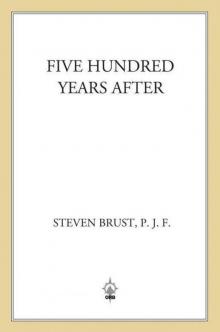 Five Hundred Years After (Phoenix Guards)
Five Hundred Years After (Phoenix Guards)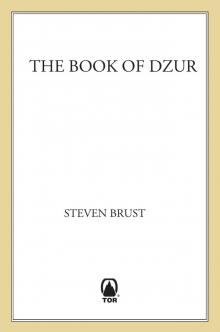 The Book of Dzur: Dzur ; Jhegaala
The Book of Dzur: Dzur ; Jhegaala The Paths of the Dead
The Paths of the Dead Jhegaala
Jhegaala The Desecrator: A Tor.com Original
The Desecrator: A Tor.com Original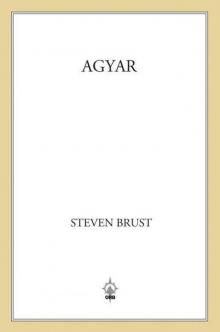 Agyar
Agyar Fireworks in the Rain
Fireworks in the Rain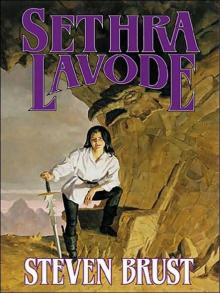 Sethra Lavode
Sethra Lavode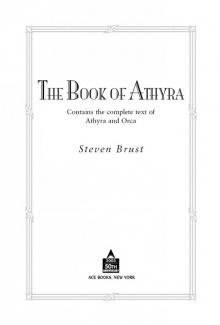 The Book of Athyra
The Book of Athyra Yendi
Yendi Good Guys
Good Guys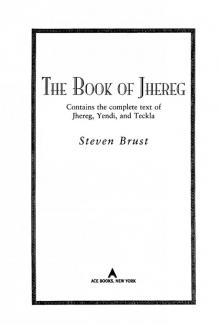 The Book of Jhereg
The Book of Jhereg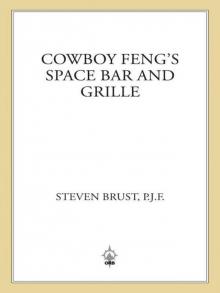 Cowboy Feng's Space Bar and Grille
Cowboy Feng's Space Bar and Grille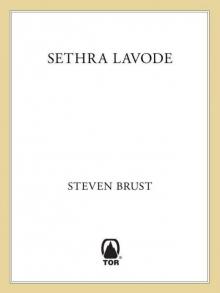 Sethra Lavode (Viscount of Adrilankha)
Sethra Lavode (Viscount of Adrilankha) My Own Kind of Freedom
My Own Kind of Freedom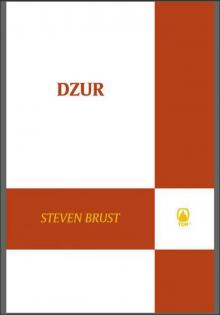 Dzur (Vlad Taltos)
Dzur (Vlad Taltos) The Lord of Castle Black: Book Two of the Viscount of Adrilankha
The Lord of Castle Black: Book Two of the Viscount of Adrilankha Fireworks in the Rain: A Tor.Com Original
Fireworks in the Rain: A Tor.Com Original To Reign In Hell
To Reign In Hell Issola
Issola Orca
Orca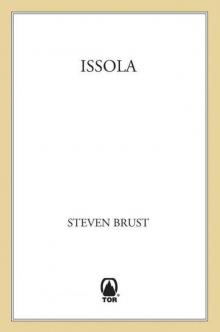 Issola (Vlad Taltos)
Issola (Vlad Taltos)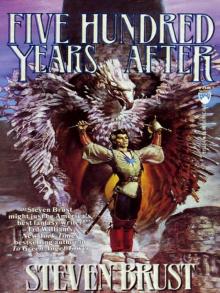 Five Hundred Years After
Five Hundred Years After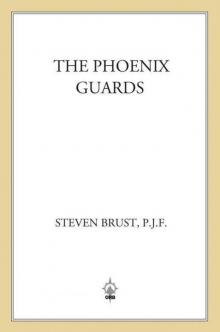 The Phoenix Guards
The Phoenix Guards Taltos
Taltos![[Vlad Taltos 06] Athyra Read online](http://i1.bookreadfree.com/i1/03/24/[vlad_taltos_06]_athyra_preview.jpg) [Vlad Taltos 06] Athyra
[Vlad Taltos 06] Athyra Vallista--A Novel of Vlad Taltos
Vallista--A Novel of Vlad Taltos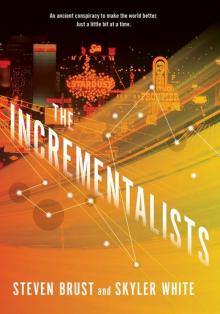 The Incrementalists
The Incrementalists![[Vlad Taltos 04] Taltos Read online](http://i1.bookreadfree.com/i/03/24/[vlad_taltos_04]_taltos_preview.jpg) [Vlad Taltos 04] Taltos
[Vlad Taltos 04] Taltos![[Vlad Taltos 03] Teckla (v 1.1) Read online](http://i1.bookreadfree.com/i1/03/27/[vlad_taltos_03]_teckla_v_1_1_preview.jpg) [Vlad Taltos 03] Teckla (v 1.1)
[Vlad Taltos 03] Teckla (v 1.1) The Book of Taltos
The Book of Taltos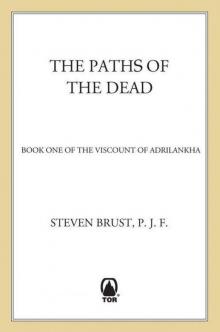 The Paths of the Dead (Viscount of Adrilankha)
The Paths of the Dead (Viscount of Adrilankha) Jhegaala (Vlad Taltos)
Jhegaala (Vlad Taltos)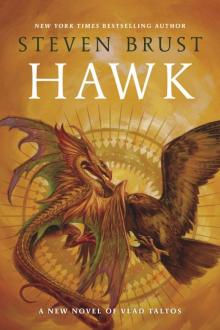 Hawk (Vlad)
Hawk (Vlad)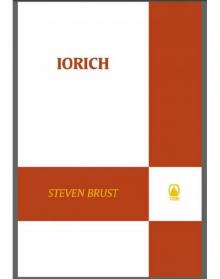 Iorich
Iorich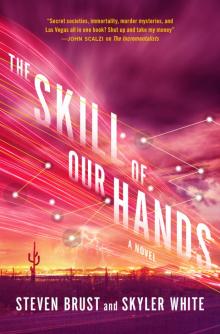 The Skill of Our Hands--A Novel
The Skill of Our Hands--A Novel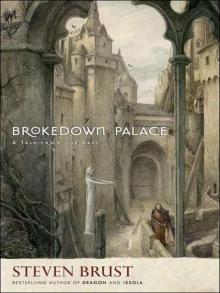 Brokedown Palace
Brokedown Palace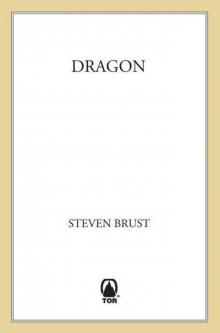 Dragon (Vlad Taltos)
Dragon (Vlad Taltos) Dragon
Dragon Athyra
Athyra Teckla
Teckla Dzur
Dzur